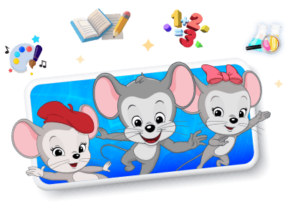
What Is Classical Homeschooling?
Learn about the benefits and potential challenges of this style of homeschooling.
As the popularity of homeschooling has skyrocketed, so have the many homeschooling methods. One of the most popular approaches is classical homeschooling, which draws inspiration from the ancient Greek and Roman educational models.
While this educational approach has been utilized in traditional schools for centuries, an increasing number of families have recently come to appreciate the advantages of a classical education that’s tailored to their homeschool.
Tip: ABCmouse covers a variety of skills and key educational subjects, providing home educators with a research-backed resource to help support their children’s learning.
What is Classical Education?
The instructional style of classical education finds its roots in a method devised by Latin writer Martianus Capella during the Middle Ages. It gained popularity during the Renaissance period when there was a concerted effort to establish a standardized approach to passing along all human knowledge.
Classical education emphasizes the study of classical languages, literature, history, and philosophy. It seeks to cultivate the minds of students by providing them with a rich and rigorous curriculum rooted in the wisdom of the past.

The classical education method aims to develop critical thinking, logical reasoning, and effective communication skills. Supporters of the classical method believe that education should focus on training the mind to think independently.
What is Classical Homeschooling?
Classical homeschooling emphasizes that knowledge is not isolated but interconnected, and learning in one area can enhance understanding in another.
Classical homeschooling curriculum typically includes the study of Latin or Greek, as these languages serve as the foundation for understanding the roots of English and many other languages. Literature plays a vital role in classical homeschooling because it exposes students to timeless works that have shaped human thought and culture.

Additionally, classical homeschooling prioritizes the study of history, recognizing that it provides a framework for understanding the present and the lessons of the past. The sciences are taught from a historical and philosophical perspective, enabling students to see the development of scientific thought over time.
The Three Stages of Classical Education
The primary objective of the classical approach is to foster independent thinking skills in children. Following the “trivium” model, students progress through three distinct stages of learning: concrete learning, critical learning, and abstract learning. These three stages of classical education are meant to build strong thinking and communication skills and a love of learning.
The concrete learning stage, also known as the grammar stage, focuses on foundational knowledge acquisition. The critical learning stage, or the logic stage, emphasizes the development of analytical thinking abilities. The abstract learning stage, referred to as the rhetoric stage, centers on honing persuasive communication skills.
The Grammar Stage
The grammar stage is the first phase of classical education. Students are in the grammar stage from kindergarten through 6th grade.
During this stage, children have a natural inclination for memorization and are receptive to absorbing information. This stage focuses on building a strong foundation of knowledge and skills.
In the grammar stage of classical education, home educators use various activities to engage students and guide their learning process. One key activity in the grammar stage is the exploration of language. Students are introduced to the basics of grammar, spelling, and vocabulary and learn how to read and write. These essential language skills will serve as the building blocks for their future education.
Literature plays an important role during the grammar stage. Students are introduced to age-appropriate folktales, fables, and myths from various cultures.

Home educators may also introduce the study of classical languages, such as Latin and Greek, during this stage. It’s thought that learning these languages can enhance a child’s understanding of English grammar and vocabulary while exposing them to the rich cultural heritage of ancient civilizations.
The study of history is prominent in all stages of classical education. Through engaging stories and age-appropriate books, students dive into the wonders of the past. They learn about significant events, ancient civilizations, and influential figures, helping to build an understanding of the world’s history.
History-themed projects, like creating timelines, building models, or participating in historical reenactments, are common activities that bring the subject to life and encourage active learning.
The Logic Stage
The logic stage, also known as the dialectic stage, typically spans from middle school to early high school.
During this stage, students shift from absorbing information in the grammar stage to developing critical thinking skills. The logic stage also involves the exploration of scientific principles, historical events, and literary analysis.
The logic stage focuses on teaching students how to analyze, evaluate, and summarize information. Students learn to ask probing questions and construct persuasive arguments. They engage in lively discussions and debates, examining different viewpoints and developing their own reasoned opinions.

This approach encourages students to think critically and develop a deep understanding of the underlying principles that govern various disciplines and enables them to make connections between different subjects and concepts.
The Rhetoric Stage
The rhetoric stage, typically covering the high school years, aims to equip students with effective communication skills and the ability to articulate their thoughts persuasively. Students learn the art of rhetoric, including public speaking, persuasive writing, and debate.
The art of public speaking and debate is a key activity in the rhetoric stage. Students learn to craft well-structured arguments, deliver speeches with poise and confidence, and engage in debates.
Students learn to express themselves with the written word through essays, research papers, and persuasive speeches. They analyze and deconstruct famous speeches and writings from history to understand the art of persuasion.

This stage encourages students to develop their own ideas and express them eloquently. It prepares them for higher education and beyond by honing their critical thinking, research, and presentation abilities.
Classical Homeschool Curriculum
Classical homeschool curriculum is designed to provide students with a broad and well-rounded education. It includes the study of language arts, mathematics, science, history, and the arts. Here are some key components of the classical homeschool curriculum:
- Language arts in a classical homeschooling curriculum includes reading, writing, grammar, and composition. The study of classical languages such as Latin and Greek is thought to enhance vocabulary, language structure, and critical thinking skills.
- Mathematics is a fundamental subject in classical homeschooling. It is taught systematically, starting with arithmetic and gradually progressing to algebra, geometry, and beyond.
- Science is explored through hands-on experiments, observation, and the study of scientific principles. The history and philosophy of science are also incorporated to provide a comprehensive understanding of scientific concepts.
- History is taught chronologically, providing students with a contextual understanding of past events and civilizations. Social studies topics, such as geography, anthropology, and political science, are also covered.
- Fine arts, including music, visual arts, and drama, are important in classical education. Students are encouraged to explore their creativity and develop an appreciation for artistic expression.
Support Your Homeschool with ABCmouse and Adventure Academy
Our digital learning programs are designed by curriculum experts to assist your homeschool and children ages 2 through 13. ABCmouse is a comprehensive online educational platform for children ages 2-8, while Adventure Academy focuses on children ages 8-13. Both programs provide access to lessons on reading, language arts, math, sciences, social studies, and more. Learn more about how each program can enhance your homeschool below.
ABCmouse and Homeschooling
ABCmouse offers over 10,000 learning activities and more than 850 lessons for children, plus a large digital library of books and educational puzzles, songs, activities, and worksheets. The program encourages self-paced learning with motivating rewards and includes progress tracking, which allows home educators to monitor time spent on certain subjects and the number of activities completed.

Then just $14.99/mo. until canceled
As a paid add-on to regular subscriptions, home educators can access the Assessment Center, which allows parents and caregivers to test children on their knowledge, determine successes and struggles, and receive recommended lessons based on assessments.
ABCmouse provides a robust curriculum that can supplement other early learning lessons. It’s trusted resource that’s been downloaded over 10 million times and has a 4.5-star average out of 831.4K ratings.
Adventure Academy and Homeschooling
Adventure Academy combines an interactive world with a curriculum covering reading, language arts, math, science, and social studies. With quests, games, and educational videos and activities, learning becomes an epic journey that motivates kids to explore various topics.
For homeschooling families, Adventure Academy offers an engaging, flexible learning experience that can supplement other educational materials. The program features thousands of activities created by curriculum experts and covers all major academic domains.
Parents and caregivers can choose academic difficulty levels and track each child’s progress, seeing time spent in Adventure Academy, activities completed, and subjects studied.
Adventure Academy emphasizes key topics such as reading comprehension, vocabulary development, mathematical operations, fractions, world geography, American history, physical science, life science, earth science, and scientific inquiry.
For more information, visit AdventureAcademy.com.
More from ABCmouse:
-
The Best Books for Kindergarteners
Discover a world of imagination with 35 must-read books for kindergarteners! Dive into adventures, laugh with humorous tales, and learn about diversity, emotions, and more in…
-
The Best Books for Second Graders
Explore 30 hand-picked books from abcmouse’s second grade reading list, from classic tales to science adventures, fostering imagination, empathy, and understanding in young readers. Great options…
-
The Best Books for First Graders
Embark on a reading adventure with 30 engaging books for first graders. ABCmouse’s 1st grade reading lists features books with diverse themes from adventure to empathy,…
-
Preparing Your Child for 1st Grade: A Checklist Guide for Parents
Discover key tips for preparing your child for 1st grade with our checklist guide. Learn about fostering reading habits, enhancing math skills, encouraging play-based learning, and…
-
Preparing Your Child for Second Grade: A Checklist Guide for Parents
Help prepare your child for 2nd grade by reading through our helpful checklist for parents. From brushing up on math and reading skills to helping your…
-
How to Teach Phonics to Second Graders
Discover effective methods for teaching phonics to second graders. From mastering vowel teams and R-controlled vowels to understanding prefixes, suffixes, and irregular spelling patterns, this article…







